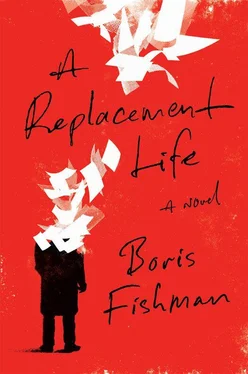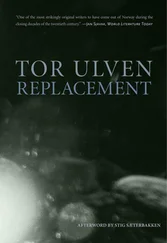“Yes, yes,” Settledecker confirmed, dribbling his head. “Now, please.” He lowered the microphone. The cake shrugged and separated herself from the crowd. Panting, she climbed the stairs, Settledecker lifting her by the elbow. The wind had stolen several strands from the golden fog of her hair. They fluttered around her face like streamers, so light in the sun that it was easy to imagine what she looked like as a young woman. In 1941, to this woman, as to Grandmother, the world must have felt like the final version of itself. Nothing could make the lives they were living seem obsolete. After the war, Grandmother would pretend to agree with the neighborhood: Grandfather was unsuitable, a hooligan. But she no longer had parents or grandparents, and in her mind, Grandfather was like a rock against whom even the worst things might break.
Had Grandfather told Slava this, or had Slava made it up?
Slava’s father, when he came to court his mother, was also unsuitable, only for the opposite reason. He was shy and hid behind his wife. Mother pretended to agree with her parents that he was unsuitable, but in her mind, he was a rest from rock-Grandfather’s dictations.
What was Slava’s place in this sequence? Would the woman he wanted to marry have to lie to her parents about the kind of person he was? In the historical pattern, he was supposed to repeat Grandfather, a rock.
On the dais, the woman, unlike Settledecker a genuine technological novice, leaned in so closely that her lips touched the microphone. “I’m sori, pliz,” she said. “I no spik English.” She looked over at Settledecker. His face was a rictus of exasperation and rage. He wheeled around and blinked at the crowd. Finally, he found whom he needed. He began to snap his fingers.
The young woman who had saved Devicki with Turtle-Face began pardoning her way through the crowd. Slava could see her in profile, her makeup glittering in the sun. From the side she looked like a painted doll, the pear of her ass swaying in a tight skirt. She mounted the stairs and turned to face the crowd. Now Slava could see her face in full.
“Hello, everyone,” she said. “My name is Vera. I will translate.” Then she turned to the older woman and whispered in Russian: “Speak.”
The seniors piled their mesh satchels with diagonally sliced halves of southwestern turkey wraps. They worked with a martial exactness, words rarely passing between them. Sima, syuda. Dai sumku. Net, te bez myasa. (Sima, over here. Give me the bag. No, don’t bother, those don’t have meat.) The husband removed the stones keeping the napkins in place, the wife plucked open two napkins, the husband nested the sandwich between them. Those without spouses worked with friends, neighbors, new partners.
“So this is the Russian-to-American account,” Slava said when Vera had finished a row of interviews at Settledecker’s side.
“The one,” she said, nodding. “I thought maybe you’d come to this.”
“Why didn’t you say anything?” Slava said.
“It’s no big deal,” she said. “It’s not like what you’re doing.”
He spun around and counted the television crews. She shrugged.
“It’s so hot,” he said. “Why is everything outside?”
“We tried. The museum didn’t like the prisoner trick. They wanted an association, yes, but they said outside only. Doing it on the lawn was the bargain. Off the record, okay?”
“You have to say that first,” Slava tried to joke.
“You’re the professional,” she shrugged.
“This was your idea, not his, wasn’t it?” Slava said.
She nodded.
“You’re good,” Slava said.
“Are you surprised?” she said. She pulled uncomfortably at her blouse. It was too coarse for the weather, but it outlined her chest handsomely; probably Settledecker had made her wear it. For ten minutes after the ceremony, the cameras interviewed Vera while Settledecker steamed beside the dais. Though he wanted the attention, he knew that he was getting what he wanted with her in front of the cameras.
“Slava, why are you doing what you are doing?” she said.
Slava looked away. “I don’t know anymore. Truthfully.”
“So maybe you don’t know everything,” she said. “Your head can be a watermelon sometimes. A lot of juice but a lot of water. You know, you could have asked me at the house what were the scrapbooks with the Halloween costumes. But you were not interested. You like to put us down. I don’t care, Slava, for your information. But them? They are old, Slava. They are in a place they don’t understand.”
“And what do you want?” he said.
“I want them to have comfort.”
“You, you,” he said irritably. “Not them.”
“I don’t know what you want me to say.”
Slava looked away. The woman who had been calling for Sima earlier shouted to find out if Sima had found the cake. Sima replied that she had, Fanechka, thank you.
The wind had won a temporary reprieve from the heat and, added to the shade they had found, was actually pleasant. You could imagine the world cooling down.
“I earn half as much as you do,” he said. “And I want away from all this. Why would your parents want us to be together?”
“For someone who wants to go away, you spend a lot of time in the neighborhood.”
“It’s temporary.”
“You sure?” she said. She watched the camera crews folding up. “You used to be different. They think it’s a phase.”
“And you agree with them.”
“You’re still one of us, Slava. A strange you is still better than an American. They can understand you.”
“Do you know what I think?” he said. “You don’t want this. They want this.”
She lifted a palm to his cheek. “You talk and talk,” she said. “You make everything so complicated. I’ll see you tomorrow.”
“What’s tomorrow?” he said.
“At your grandfather’s?” she said. “Everyone’s getting together. The applications are due the next day.”
“I know when the applications are due. No one told me.”
“They came up with it at our place last week. Your grandfather didn’t tell you? I think he’s a little afraid of calling you. But it’s not like you’re not invited. You are the author.”
“My grandfather invited people to his house?” Slava said. She had to have mixed something up.
“It’s a nice idea,” she said. “Really an excuse to spend time together. Our old people are lonely.”
His grandfather was going to have over the Katznelsons, the Kogans, the Rubinshteins? Whose grave inconsiderations he had borne with an unspeaking pride all these years? But six weeks ago, an evening hello from an investigator for the Claims Conference also would have seemed far-fetched.
Slava peered past Vera at Peter, skulking around the seniors, strands of Yiddo-English rising into the air. Slava wouldn’t bother trying to file a piece for Century . Peter would get only the cream of the story, but he would write about what had actually happened: the survivors’ agenda, their quotes. It was far better for these old people to have Peter Devicki file a piece. His was far likelier to see print.
He turned back to Vera. Of course he would be there.
Otto Barber had a professor’s wild, unkempt hair, its loose gray strands billowing mildly in the line of a fan thrumming from above the bar. All around Otto, young people were working through liter-size pitchers of lager, but the German had ordered in the European manner, 3 liters. Lifting the glass, he barely wet his lips. Watching from the doorway, Slava was reminded of a walk he had taken with his father in Italy. After many aimless turns, they stopped, Slava not sure why, at the window of a café like a hundred others. This one had only a single customer, sidled up to the copper-top bar. It was the lunch hour; he was in his postman’s uniform. He ordered a juice — Slava’s father, of lesser eyesight and lesser Italian, asked Slava what kind it was, and Slava proudly said, reading the label, pera, grusha, pear. The barman retrieved the potbellied bottle from a fridge, followed by a lowball from a rack. He deposited a small square napkin on the bar, on it the empty glass. Then he tipped the bottle of juice over the glass. The two men continued to talk while the barman poured. He poured for a minute. The final drops slid from the neck of the bottle with torturous slowness. Finally, the bottle was empty, the glass filled to its neck. The two men spoke for another minute before the post
Читать дальше











